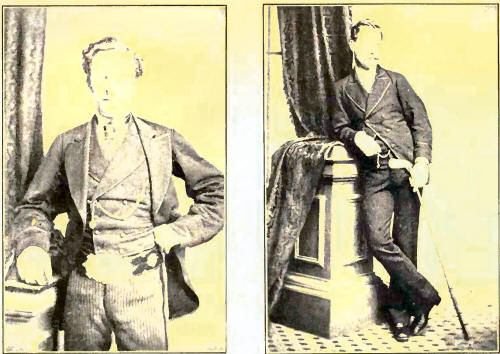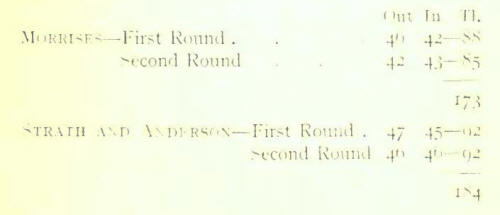|
WHEN at Muirfield in 1896,
watching, as he puts
it, "the tide of glorious battle," my friend the
Rev. William Proudfoot, one of the parish
ministers of Haddington himself a great golfer,
admirable writer, and very fine preacher, son of
the able schoolmaster of Leuchars in my youth
had the good fortune to "foregather with that grand old golfer, Mr William Doleman, of
Glasgow." In regard to Mr Doleman, he very
justly says: "As all who know him will frankly
admit, his golfing lore is comprehensive and
accurate, and his critical estimate of golfers is
never lightly spoken, never merely fanciful, but
always thoughtful and based on something like
solid argument." Mr Doleman and Mr Proudfoot were talking of Herd's marvellous 72, and
they reverted back to talk of "the immortal days
of Tommy." The mention of the name suddenly
lit up the face of the old golfer a sure signal that
some reminiscence, humorous or serious, was
forthcoming. "I tell you, sir, there isn't a man,
English or Scotch, in all this field that impresses
me with the same sense of power, or golfing
genius call it what you like as Tommy did,
the instant he addressed the ball." He had just
been speaking with warm admiration of Braid,
Vardon, Taylor and Herd, and Mr Tait, but his
heart had to return to the old love, to the kindling
memory of a prowess that has never been quite
restored to the green by even the most brilliant of
present-day heroes.

Old Tom and Young Tom
Mr Proudfoot could not but
concur in the remarks. It was just his own
feeling. He told Mr Doleman so, adding that he
seldom cared to express it in the presence of a
younger generation, who were never slow to
ascribe it to rank prejudice. "Prejudice is
theirs," replied Mr Doleman, "and proof, I
humbly think, is thine." "But they tell us he
had nobody to play against." "That's nonsense, for he had Davie Strath, Bob Fergusson,
Jamie Anderson and other notable golfers; but
supposing he hadn't, he had always the ideal, the
'par' score of the green to play against. Pin
them to that, and let them wriggle as best they
can, for it is there we get at Tommy's position in
the golfing world of to-day." Then came the
following train of reasoning. "He asked me,"
Mr Proudfoot tells us, "what I thought the 'par'
play on Muirfield." Mr Proudfoot went over the
holes thus:
Out, 3 4 4 4 5 4 4 4 4 - 36
In, 4 5 4 4 3 4 5 4 5 - 38 -- 74
171 The calculation was allowed to pass. Indeed, it
was the same as Mr Doleman's own calculation,
and that of some professionals with whom he had
discussed the question. Perfect play, then, for
the 2 rounds, or the 36 holes, may be set down at
148. In favourable weather conditions, the best
score for the two rounds in succession at the
Championship meeting was 155, or 7 strokes
worse than the ideal. He then, according to the
very same standard of reckoning, submitted the
"par" play at Prestwick in 1870, when Young
Tom won the Champion Belt for the third time in
succession. First hole, 5; Alps, 5; Tunnel, 3;
Stone Dyke, 5; Sea He'therick, 5; Tunnel, 4;
Green Hollow, 3; Station, 3; Burn, 5; Sauch
House, 4; Short Hole, 3; Home Hole, 4; total,
49. Three rounds were played, to make up the
36 holes. The "par" score accordingly stood
at 147. And what was Tommy's card on that ever-memorable day? It was 149, or only two strokes
in excess of absolutely faultless play. That
aggregate, unequalled in the history of the
Championship, was made up thus: 47, 51, 51.
"Now, sir," said the very shrewd and analytical
old golfer to Mr Proudfoot, "if in the face of
facts like these, which no man can deny, anyone
will venture to accuse us of prejudice, or tell us
we are the antiquated slaves of foolish sentiment,
or that we haven't seen as great things in our
young day as any the present can show, I know
with whom lies the prejudice, and I leave all
such to love their own darkness. Some of these
moderns are grand golfers, no doubt, but the
more I think out these things, the more am I
convinced of Tommy's surpassing greatness,
and the better am I able to vindicate his superiority against all comers."
To this Mr Proudfoot adds: " My old friend's
argument seemed good, sound sense. There are
other considerations, too, in the shape, not of
sentiment, but of evidence, which go to strengthen
his contention. Herd's 72 at Muirlield (par play
being 74) is matched by Tommy's 47 at Prestwick
(par play being 49); and while Herd fell grievously away in the subsequent round, Tommy
held steadily on to a very high level of excellence.
Herd's 77 in the Open Championship at St
Andrews in 1895. the finest achievement of the
meeting, was equalled by Tommy twenty-six
years ago in a professional tournament, and
those deeds of a quarter of a century back were
performed when less attention was given to green-keeping, with old-fashioned clubs, with neither
bulger nor mashie, nor putter of the twisted neck,
which, according to their fancies, go to saving
of strokes, and with hand-hammered balls that
did not rejoice in the name of 'Agrippa' or
'Silvertown.'"
In regard to Tommy's record score of St
Andrews links, it is somewhat amusing to read
the figure at which it was put in a paragraph in Boys for May 1894, page 490: "Spofforth, on
his best day, or in his best season, was incomparably the finest bowler that ever donned cricket
shoe. What cricketer will ever forget that first
famous appearance at Lord's? No event in the
record of ball games in our memory, at all
events ever created such a furore. The nearest
approach to it that I can think of is, when in
golfing circles it was passed from mouth to mouth,
in awestruck whispers, that Tommy Morris had
done the medal round at St Andrews in 1774.
But as golf had not taken the deep hold on the public fancy that it since
has done, the excitement in that case was more or less of a local
character. Moreover, since poor Tommy's
death, we believe his record has been
broken."
On the 17th July 1873 Tommy and Jamie
Anderson played 3 rounds over St Andrews links
against Davie Strath and Tom Kidd. The
former, after being 2 down at the end of the
first round, won by 8 holes out of the 54. A
contemporary record says: "It is doubtful
whether such an exhibition of foursome play was
ever witnessed, the average of the 3 rounds being
a little over 85."
As a matter of fact,
according to the careful statistics kept by Mr J. G. Denham, the
rounds of the winners were 89, 82 and 81 252;
while their opponents were 87, 85 and 88
260.
In 1875, on the 7th of May, the first professional match of the season was played at St
Andrews between Old and Young Tom Morris
against Davie Strath and Jamie Anderson. Two
rounds were played, and the stake was £20. A
local report says that "the play on the whole was
not marked by great brilliance, though some rare
good shots were made on both sides. A defect
of both parties, noticeable at the outset, was a
timidity on the putting-greens, but the players
attained more confidence as the game progressed.
In the second round especial!)' the play of Strath
and his ally was very bold, but their too-great
daring placed them several times into hazards
which otherwise they would have escaped. The
Morrises played with their usual caution, and
landed the stake with the substantial majority of
7 holes, or n strokes." The respective scores
were:
 |

